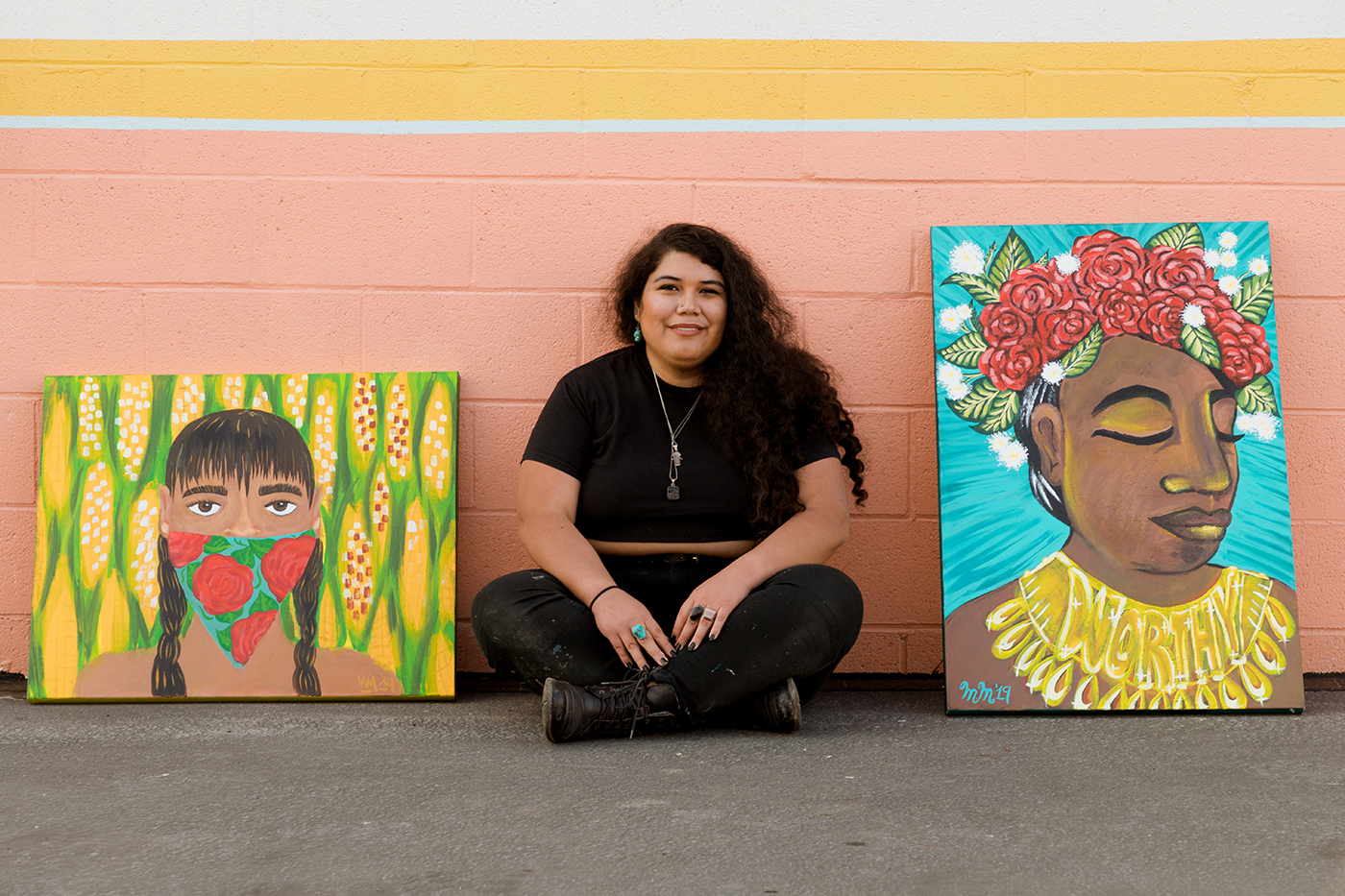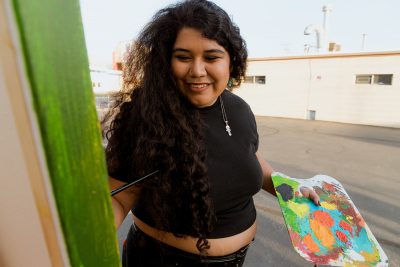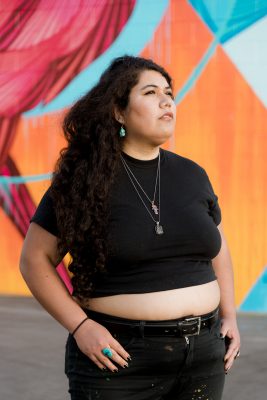
“Colorful, Angry, Happy”: Activist Mariella Mendoza Uses Art As a Call-to-Action
Art
Local activist and artist Mariella Mendoza describes their artistic style as “colorful and angry, but also very happy.” They grew up undocumented in northern Utah and say life didn’t become easier after the Deferred Action for Childhood Arrivals (DACA) began, which aims to protect undocumented children from deportation. Mendoza channels the experiences of growing up undocumented and being a queer, nonbinary person into their art. Having a cartoonish style allows Mendoza to create bright, colorful pieces while also representing darker experiences. “I wanna draw the tender things that my younger self deserved, but I also wanna draw the angry things that adults need to see,” Mendoza says.

“I wanna draw the tender things that my younger self deserved, but I also wanna draw the angry things that adults need to see.”
Working alongside numerous activist organizations, Mendoza has created murals, installations and more for various causes around the state. Among the many organizations Mendoza works with are Decarcerate Utah, which advocates for dismantling the prison-industrial complex; Uplift, which mobilizes youth for climate justice in the southwest; and Nopalera Artist Collective, which gathers local artists of color to create murals, installations and more. While Mendoza does create larger pieces for these movements, they also design documents such as flyers, infographics and press releases as part of their media strategies. Mendoza understands that one of the primary roles of art in social movements is as a media strategy: Everything must be clear and concise to be effective. “As visual artists, we are aware of the power of colors, shapes and contrast and how to use these tools to communicate our message,” says Mendoza.
Every piece Mendoza has created has been significant and holds the impact that media strategy requires. There are a few moments, though, that stand out as particularly moving for Mendoza on a personal level. Last summer, they worked with a crew to paint the Justicia Para Todos mural along Park City’s historic Main Street, which features portraits of police brutality victims alongside the call for “justice for all” in Spanish. One crew member was the brother of Cody Belgard, who was shot in the back by police in 2018. When Belgard’s portrait was finished, his brother laid down by its side. “It was all so special and meaningful and so powerful, I will cherish it forever,” Mendoza says. This work is not without its dangers, however. The crew was harassed by people while they worked, but they just kept working and listening to music. Afterwards, nearby restaurant workers, who Mendoza says were mostly people of color, thanked them for playing music in Spanish, creating another beautiful moment in the harshness.
“As visual artists, we are aware of the power of colors, shapes and contrast and how to use these tools to communicate our message.”
In addition to their art, Mendoza is also a prominent activist within the LGBTQ+ community and was the first undocumented person to speak at the Utah Pride Festival, a fact they didn’t find out until moments before they were to speak. “You know, sometimes I think about it and I just feel so lucky,” says Mendoza when reflecting back on that moment. Despite the significance of this moment, Mendoza thinks of themselves not as a leader but as someone working and being a part of something bigger than themselves. “The LGBTQIA+ community here is full of talented, passionate babes who are constantly teaching me to be better and to also like, speak for myself too, you know?” Mendoza says. To them, the community is a place where people are constantly learning and growing from one another.
Even with the importance of the representation Mendoza provided by being the first undocumented, queer and nonbinary person to speak at Pride, representation itself will never be enough. In fact, if representation is the only goal, it can be damaging rather than helpful to the movement. “The thing about representation is that it’s not going to save us and can too often lead to this tokenizing idea of ‘everything is okay now because I am visible,’ when in reality, trans and queer folks continue to live on the streets, continue to struggle and continue to be displaced,” Mendoza says.

When it comes to activism, mutual aid and community work, Mendoza believes the work is done in just that way—as a community. “I don’t really believe in doing work ‘for the community.’ I think that the most valuable work happening right now is being done by everyone alongside each other,” says Mendoza. Some of the most important ways people can give their support to BIPOC and LGBTQ+ communities, according to Mendoza, is to “encourage BIPOC [and] LGBTQIA+ folks to continue to create and to experience radical joy at their own pace.” Mendoza says art is a continual process that doesn’t stop just because the artist might not be working on a piece at that moment. Too often, people also lose their artistic desires because of the pressure to make money or conform to common beauty standards.
“I don’t really believe in doing work ‘for the community.’ I think that the most valuable work happening right now is being done by everyone alongside each other.”
What this means for Mendoza is that people must support art that makes them uncomfortable and accept the art that artists want to make. “When I think of my queerness, particularly my gender, I get really excited over how beautifully ugly it is and how dark and angry it can get,” says Mendoza. “Support artists by loving them as they are, and support our communities by accepting the feeling of being uncomfortable.”
As for the work anyone can do, Mendoza says, “Make bold decisions, engage in conversations about reparations and LAND BACK!” Mendoza can be found on Instagram @marim4cha and on their website mariellamendoza.com.
